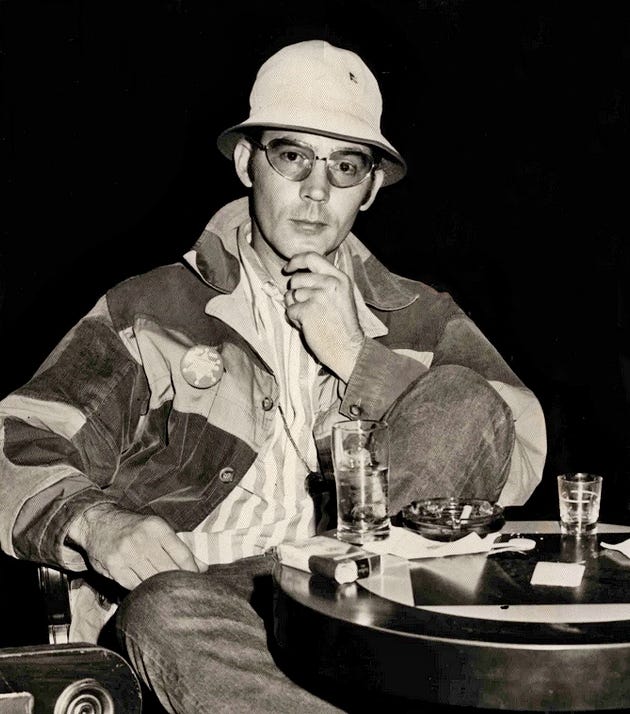I Fancied Myself Hunter S. Thompson. I Was Not.
The first piece I submitted was published by The New York Times. It was all downhill (uphill?) from there.

The first personal essay I wrote was published by The New York Times. I wrote the piece in one sitting and barely edited it before flinging it over to the editor. I’d spent more time waiting in line at bars in New York than I did drafting that piece. Clearly, I concluded, writing was a piece of fucking cake. Spoiler alert: I was wrong.
A few days after submitting the piece, I got a note from the editor of the column, Frank Flaherty, asking me if I could hop on a call. I didn’t know then that he had already intended to accept the piece, though, in retrospect, what else would he want? To invite me to his fantasy football group?
“How old are you?” he asked.
“28.”
“Where else have you been published?”
“Umm, nowhere,” I said.
He seemed surprised by that.
“This is a really nice piece,” he said. “I’d like to publish it.”
“Thank you.”
I think he thought I didn’t grok the import of my piece being published by the Times—he was right and wrong—so he emphasized the point.
“You should be proud,” he added. “I get hundreds of submissions a week.”
Though The New York Times (and legacy media in general) gets a bad rap today, getting published in the Times was a big deal for a young writer. This particular column, the now-defunct “New York Observed” column, was one of the most coveted personal essay markets in the country. I was keenly aware of that fact.
Something super plausible occurred to me. Maybe writing was hard for other people. Maybe I was a natural. Maybe, just maybe, I was The One.
What made matters worse were the circumstances surrounding the piece that conspired to convince me that I was some sort of renegade writer, a Hunter S. Thompson figure swashbuckling through life with a laptop and an engraved flash. All that was left was to buy an engraved flask.
The piece I wrote (linked here for anyone who wants to waste one of their free monthly Times articles) was about an incident in which I’d been caught stealing coffee from another office in the building that housed the PR agency from which I’d just quit. I didn’t just quit, mind you. I quit with style.
I was working as a sellout at a PR sweat shop in Manhattan. When the CEO’s minions wheeled out whiteboards with our names on them, indicating the quota of phone calls we had to meet each day—75—I had had enough. I beelined it to Best Buy, bought a flash drive, and saved all of my files onto the drive, expecting the worst from my employer, who was known for ordering security to escort employees out of the building with a box full of their belongings resting on their supine forearms.
Once my files were secure, I wrote a memo—or was it a mission statement?— about how the company should be run, and sent it to the CEO, a guy notorious for holding grudges and filing lawsuits. Then, I marched into HR’s office to give my notice. A few weeks later, I got a call from Mr. Flaherty about a piece I’d written about stealing coffee while working for the agency I’d just quit—a sign from the writing gods that unyoking myself from the capitalist machine all but guaranteed my expedited fame and fortune.
Not only that. A former coworker told me that someone taped a copy of the article on the very coffee machine from which I’d pilfered. I was a writer of the people! A revolutionary who fought with the pen, not the sword. I wasn’t a petty thief. I was a literary Robin Hood, stealing from the rich and giving to the poor: me.
I had arrived.
But…
But you already know what I’m going to tell you.
Fame and fortune did not follow. Turns out—and I’m sure this will surprise absolutely no one—that quitting a job without a plan is pretty stupid. I had a bad day at work and decided to have my Jerry Maguire moment, counting on my writing and what little savings I had to see me through.
I did manage to get a few other pieces published in the following months, but nothing to rival the prestige (or compensation) of the Times. In fact, that was the only publication that paid me during that period. I burned through my savings in a few months, forcing me to move out of my apartment and back in with my parents.
To this day, that New York Times essay is probably my most “high-profile” publication. Following that easy win, life gave my delusions of grandeur short shrift, as I quickly became inured to rejections and ghostings. I wasn’t making money as a writer. I stopped getting published. I got discouraged and eventually found my way back to another depressing job, which sapped all of my creative energy. Months became years.
Today, I ghostwrite for executives at Fortune 500 companies: speeches, bylines, etc. I guess you could call me a “professional” writer, but that’s not the kind of writing I aspire to. Don’t get me wrong, I’ll take what I do over a lot of other kinds of jobs, but it ain’t The Great American Novel.
Making money off of writing has never been easy, but it’s particularly elusive in the ascendant distraction economy, especially if your chief goal, like mine, is to tell stories, long stories.
I don’t know where my writing journey will end, but at least I’m better suited to walk its path. I can withstand its unreasonable demands and navigate its remorseless vagaries because today I know something I didn’t know then:
There are no shortcuts in this game.



